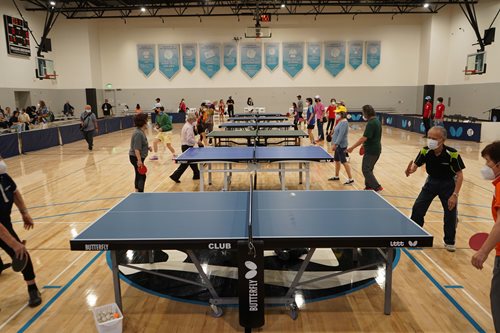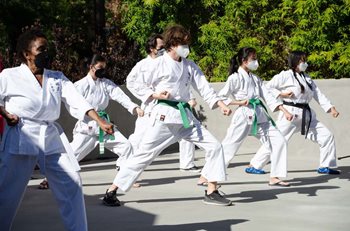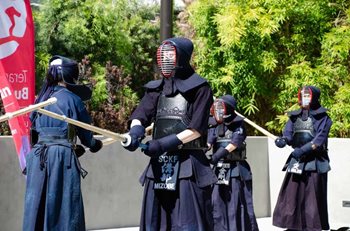Little Tokyo Service Center (LTSC) had been working on the plans for years, and they had hoped to have a grand celebration to mark the completion of the work. But by the time LTSC's Terasaki Budokan was ready to open its doors, the pandemic was in full swing. They opened gradually. And this spring, residents were finally able to celebrate the new community space the way they were meant to: Together.
"For us, the whole pandemic has been shifting and pivoting, so we're excited to finally see Budokan fulfilling its mission," says Ryan Lee, director. That mission includes supporting not just affordable housing, but the whole community, providing a place for residents to gather and share culture, sports and learning. Terasaki Budokan is a true example of comprehensive community development.
 "It's a place to belong and feel like part of the community," Lee says. "We have senior programming, exercise, afterschool programing – so many things." In 2021, Budokan's summer camp enrolled 80 youth. The MiCASA afterschool program saw 85 participants. Older adults signed up to learn about computers, play ping pong and more.
"It's a place to belong and feel like part of the community," Lee says. "We have senior programming, exercise, afterschool programing – so many things." In 2021, Budokan's summer camp enrolled 80 youth. The MiCASA afterschool program saw 85 participants. Older adults signed up to learn about computers, play ping pong and more.
"We'd waited more than 25 years to have this community space, and to wait longer due to the pandemic – it was tough," Lee says. When they did get a chance to celebrate at the end of March, the energy was unbelievable. "It's clear the downtown area and the community needed this recreation space to keep families and seniors engaged. How do you build long-term community? This is how. It felt like home for a lot of people."
Comprehensive approaches are required to support and nurture whole communities, explains Paul Singh, vice president, Community Initiatives, for NeighborWorks America. "This includes linking housing with cultural, recreational and educational opportunities. We're committed to deepening our support for these holistic approaches and we know many of our network organizations are doing the same." Toward that end, NeighborWorks' Project Reinvest provided $27.5 million to help 55 organizations across the country, including LTSC, stabilize and revitalize neighborhoods.
Singh, vice president, Community Initiatives, for NeighborWorks America. "This includes linking housing with cultural, recreational and educational opportunities. We're committed to deepening our support for these holistic approaches and we know many of our network organizations are doing the same." Toward that end, NeighborWorks' Project Reinvest provided $27.5 million to help 55 organizations across the country, including LTSC, stabilize and revitalize neighborhoods.
Since it's opened, those both inside and outside Little Tokyo have visited Terasaki Budokan. Older residents, especially, have taken advantage of the gathering place.
"I have been waiting for the Budokan opening since a long time ago," Yukiko, a Little Tokyo resident in her 80s, says through a translator. "Now it has become a part of my life and it makes me feel that I'm part of the community."
Terumi, in her 70s, had been itching to play ping pong and socialize. She also takes Zumba. "It's my weekly routine now."
 Mototsugu Sekiya is senior activities coordinator of the Far East Lounge program, so named because activities started with small classes at the Far East Lounge, LTSC's senior wellness space several blocks from the Budokan. During the pandemic, LTSC offered virtual classes to try to keep participants engaged until the Budokan opened. But few people had the technology to participate. Sekiya says they currently have 112 seniors participating in programs. More than 2,000 individuals attended some form of programming between June and December.
Mototsugu Sekiya is senior activities coordinator of the Far East Lounge program, so named because activities started with small classes at the Far East Lounge, LTSC's senior wellness space several blocks from the Budokan. During the pandemic, LTSC offered virtual classes to try to keep participants engaged until the Budokan opened. But few people had the technology to participate. Sekiya says they currently have 112 seniors participating in programs. More than 2,000 individuals attended some form of programming between June and December.
As people waited for Terasaki Budokan to open, the question was always: When? "Random seniors asked me on the street almost every time I walked through the Japanese Village Plaza," Sekiya recalls. When the center opened, "I was so happy from the bottom of my heart."
Most of Sekiya's participants are Little Tokyo residents who speak Japanese, though some speak Korean, Chinese and Spanish. "Language and cultural barriers still exist," he says. "And many seniors have experienced being socially isolated." The Far East Lounge program helps them feel like the important part of the community they are. "I believe our program is creating the bridge between our seniors and the community."
Terasaki Budokan is also lifting area businesses, something organizers hoped for from the beginning. Kouraku, a restaurant that helped provide food for the grand opening, saw an increase in restaurant customers, says Mamoru Tokuda, manager.
Philip Hirose, whose Azay also provided food for the event, sums it up: "Our family's hope is that the businesses and Budokan can have a symbiotic relationship with a deep understanding of each other's needs," he says. "I'm looking forward to this process as it will bring about many creative ways we can support each other."
05/12/2022

